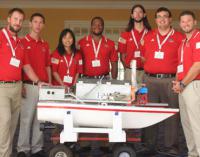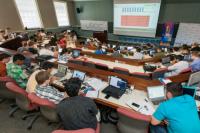-
GW Program on Extremism expands research, expertise
Since its launch in June 2015, the George Washington University’s Program on Extremism has contributed research and analysis on violent and non-violent extremism. GW notes the program’s report ISIS in America: From Retweets to Raqqa has been used by policymakers and law enforcement as a trusted source. Now in its second year, program leadership says they will continue to grow as a leading resource of expertise and research on extremism by expanding with new initiatives and hires.
-
-
Nuclear forensics summer program trains students for a future in nuclear security
A sure sign of summer is the return of interns to the Lawrence Livermore campus. Students interact with premier researchers and access equipment and facilities not available anywhere else, while scientists lay groundwork for advancing their fields. LLNL runs an eight-week summer internship for students interested in nuclear science and its range of specialties — nuclear forensics, environmental radiochemistry, nuclear physics, and beyond. Together, these disciplines support the laboratory’s nuclear security mission through analysis of nuclear processes and properties.
-
-
French schools to hold security drills, including mock terrorist attacks
As part of the French government’s bolstering of security measures in the wake of a series of terrorist attacks, French schools, beginning with the new school year, will now conduct three security drills a year – including at least one drill in which a mock assailants enter the school building.
-
-
Increasing the number of American engineers, scientists
Over the past several years, the U.S. has ranked low among other nations in numbers of students proficient in math and science, as well as skilled workers in those fields. According to researchers, American students are perfectly capable and interested in entering those fields, but are not being encouraged to pursue a STEM career. The researchers identifies factors that could lead more young students to successful careers in the science, technology, engineering, and math (STEM) fields.
-
-
Climate change already accelerating sea level rise
Greenhouse gases are already having an accelerating effect on sea level rise, but the impact has so far been masked by the cataclysmic 1991 eruption of Mount Pinatubo in the Philippines, according to a new study. Satellite observations, which began in 1993, indicate that the rate of sea level rise has held fairly steady at about three millimeters per year. But the expected acceleration due to climate change is likely hidden in the satellite record because of a happenstance of timing: The record began soon after the Pinatubo eruption, which temporarily cooled the planet, causing sea levels to drop.
-
-
Texas, UT ask judge to throw out lawsuit challenging campus carry
The Texas Attorney General’s Office and University of Texas at Austin on Monday asked a federal judge to throw out a lawsuit brought by three UT-Austin professors seeking to keep guns out of their classrooms despite the state’s new campus carry law. Three professors have argued that the law, which went into effect 1 August, will stifle discussion in their classrooms. The professors say they fear that guns present during class discussions will cause people to censor themselves out of concerns for their safety.
-
-
$40 million funding opportunity for homeland security quantitative analysis COE
DHS S&T the other day announced a $40 million funding opportunity for an institution to lead a new DHS Center of Excellence (COE) for Homeland Security Quantitative Analysis. This new COE will conduct end user-focused research to enhance the application of analytic tools that support real-time decision making and address homeland security-related threats and hazards.
-
-
Battelle awards over $300,000 to boost STEM education
Battelle — operator of Pacific Northwest National Laboratory — has boosted a network of STEM education organizations, awarding over $300,000 in grants to benefit K-12 schools, higher education institutions, community partnerships, and other non-profit organizations.
-
-
New UAlbany undergrad major in emergency preparedness, homeland security, cybersecurity
The University of Albany’s College of Emergency Preparedness, Homeland Security and Cybersecurity has received approval from the New York State Education Department to establish the bachelor’s degree program in emergency preparedness, homeland security, and cybersecurity at the start of the 2016-2017 academic year. The college is the first stand-alone academic institution in the United States dedicated to emergency preparedness, homeland security, and cybersecurity.
-
-
Penn State adds new homeland security offerings

Penn State is expanding its portfolio in homeland security with a new graduate-level certificate that focuses on how to ensure that hospitals and medical care facilities stay functional during emergencies and disasters. In the coursework for the 15-credit certificate, students will learn the ways to prepare hospitals for and respond to emergencies, such as mass-casualty events, floods, earthquakes, disease outbreaks, or terrorist attacks.
-
-
Enrollment in U.S. science and engineering graduate school increases

After remaining essentially flat for the past two years, the number of full-time graduate students enrolled in science and engineering (S&E) programs rose by 2.4 percent in 2013, to nearly 425,000 students. The increase was largely due to a 7.9 percent rise in full-time enrollment of foreign graduate students on temporary visas. Foreign enrollment hit an all-time high of 168,297 students in 2013, or 39.6 percent of the full-time S&E graduate student population—up from 35.9 percent in 2008.
-
-
The future of naval force and RoboBoats

The future of naval engineering was on display earlier this month, as thirteen teams of high school and college students did battle at the ninth annual RoboBoat Competition in Virginia Beach, Virginia. The competition is a robotics contest where teams program their student-built autonomous surface vehicles to navigate through a series of water-based challenges.
-
-
DHS announces the Countering Violent Extremism grant program
Secretary of Homeland Security Jeh Johnson on Wednesday announced the Fiscal Year (FY) 2016 Countering Violent Extremism (CVE) Grant Program, with $10 million in available funds. DHS snotes that this is the first federal assistance program devoted exclusively to providing local communities with the resources to counter violent extremism in the homeland.
-
-
Holocaust survivors give historic $400 million gift to Ben-Gurion University
A couple who survived the Holocaust and made a fortune investing with Warren Buffett left a $400 million bequest to Ben-Gurion University (BGU). The bequest, much of which is earmarked to fund water-related research, is expected to double the size of BGU’s current endowment. The university’s Zuckerberg Institute for Water Research focuses on sustainability of water resources, desalination techniques, and improving water quality.
-
-
Nation’s elite cybersecurity talent participate in U.S. Cyber Challenge program

A week from today, Illinois’ top cybersecurity talent will descend upon Moraine Valley Community College outside of Chicago to participate in the annual U.S. Cyber Challenge (USCC) Cyber Camp. During the week-long camp, individuals will participate in a variety of classes that cover such subjects as packet crafting and pen testing, and compete in a virtual Capture the Flag competition to demonstrate their cybersecurity abilities in a free-form environment in hopes of winning one of the limited (ISC)2 scholarship vouchers.
-
- All
- Regional
- Water
- Biometrics
- Borders/Immig
- Business
- Cybersecurity
- Detection
- Disasters
- Government
- Infrastructure
- International
- Public health
- Public Safety
- Communication interoperabillity
- Emergency services
- Emergency medical services
- Fire
- First response
- IEDs
- Law Enforcement
- Law Enforcement Technology
- Military technology
- Nonlethal weapons
- Nuclear weapons
- Personal protection equipment
- Police
- Notification /alert systems
- Situational awareness
- Weapons systems
- Sci-Tech
- Sector Reports
- Surveillance
- Transportation
Advertising & Marketing: advertise@newswirepubs.com
Editorial: editor@newswirepubs.com
General: info@newswirepubs.com
2010-2011 © News Wire Publications, LLC News Wire Publications, LLC
220 Old Country Road | Suite 200 | Mineola | New York | 11501
Permissions and Policies
Editorial: editor@newswirepubs.com
General: info@newswirepubs.com
2010-2011 © News Wire Publications, LLC News Wire Publications, LLC
220 Old Country Road | Suite 200 | Mineola | New York | 11501
Permissions and Policies
